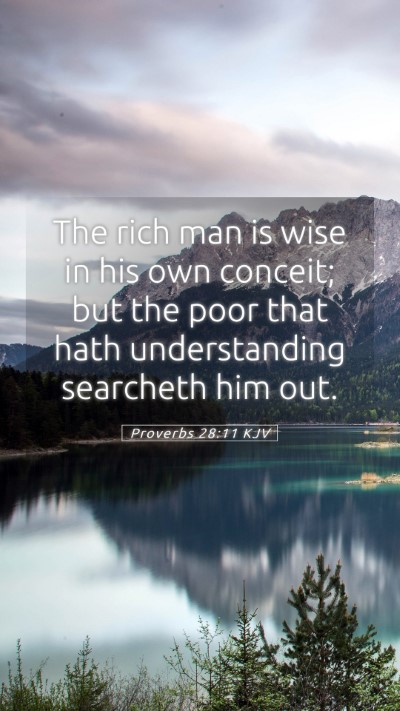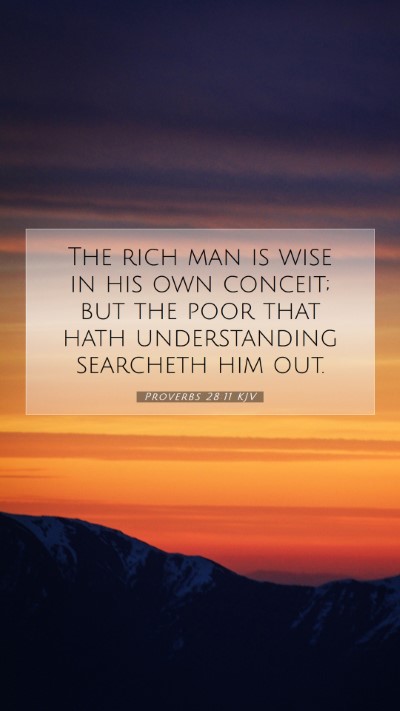Bible Verse Meanings: Proverbs 28:11
Proverbs 28:11 states, "The rich man is wise in his own eyes; but the poor that hath understanding searcheth him out." This verse touches on the themes of wealth, wisdom, and how true understanding is not necessarily tied to material possessions. Below is a detailed commentary synthesizing insights from Matthew Henry, Albert Barnes, and Adam Clarke.
Verse Explanation
This proverb contrasts the perception of wisdom among the rich with that of the poor who possess understanding. It illustrates that:
- The rich man’s self-perception: The rich often consider themselves wise due to their wealth and status. This self-assuredness can lead to arrogance, where they may believe their insights and decisions are beyond question.
- The wisdom of the poor: In contrast, those who lack wealth but have knowledge or insight do not rely on their status. Instead, they seek to understand and discern truth, suggesting that real wisdom involves the humility to learn and grow.
Biblical Exegesis
Albert Barnes outlines that this verse acts as a social commentary, indicating that true wisdom stems from one's understanding and not merely from their riches. Those with financial means may find solace in their possessions, leading to a superficial comprehension of life. In contrast, the poor may be more inclined towards seeking deeper truths.
Adam Clarke adds that the phrase “the poor that hath understanding” emphasizes the value of insight over wealth. It suggests that moral and spiritual riches far surpass monetary wealth, and a wise individual—regardless of economic status—engages in seeking out wisdom, thus revealing both the futility and folly in trusting only in one’s riches.
Interpretations Across Commentaries
Matthew Henry notes that the rich man’s self-concept often blindfolds him from true wisdom. The implication is that one should not esteem knowledge based solely on wealth. Instead, true wisdom includes a heart of understanding that seeks to grasp and apply the realities of life.
Furthermore, both Barnes and Clarke allude to the biblical principle that wisdom begins with a fear of the Lord (Proverbs 1:7). Accordingly, understanding emerges from a humble acknowledgement of one’s limitations and the pursuit of divine truth.
Application of the Verse
This verse encourages readers to reflect on the following aspects for application in daily life:
- Self-Reflection: Assess whether personal wealth might be leading to complacency instead of wisdom.
- Value of Understanding: Recognize and treasure insights that come through life experiences over material possessions.
- Cultivating Humility: Maintain a posture of humility, especially in positions of influence, to seek and learn from others.
Cross References
- James 1:9-10: This passage emphasizes the spiritual equality between the poor and rich, pointing out how status does not determine one's standing in the kingdom of God.
- Proverbs 22:2: This verse highlights that the rich and poor meet together, suggesting that the Lord is the maker of them all, hinting at the unity of humanity beyond wealth.
- Proverbs 1:5: It indicates that even the wise can gain wisdom through hearing and increasing learning, reinforcing the theme that wisdom is a continuous pursuit, independent of economic status.
Conclusion
In summary, Proverbs 28:11 invites a deeper understanding of wisdom and social equity between the rich and the poor. Whether studying in bible study groups, engaging in online bible studies, or utilizing various bible study tools, it's crucial to approach Scripture with an open heart to the vital insights it offers on the nature of wisdom and human value.


